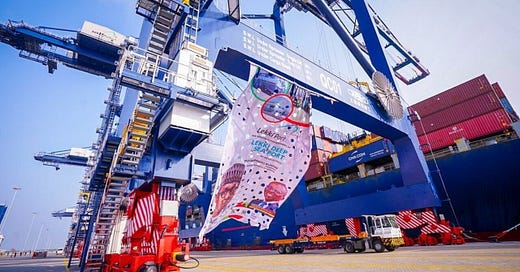Good morning.
We are covering the presidential inauguration of the Lekki deep sea port and the dangers ahead. And a new report details the killings and abductions of Catholic priests in Nigeria last year.
If you are enjoying this newsletter and finding it useful, I’d like to ask for a favour: please support my work by sharing it with your family and friends.
Every subscriber gets an email every morning before 7:00 (WAT) that tries to explain what’s happening across the country and provides some context. I also run a special desk on climate and China.
Buhari commissions Lekki Deep Sea Port
I started my journalism career at ThisDay headquarters in Apapa some 10 years ago; the office on Creek Road was sandwiched between the Lagos Port Complex and the Tincan Island Port Complex. And it was hell navigating those pot-hole ridden roads, which were clogged by an interminable queue of tankers; you could hardly get anywhere without jumping on motorcycles driven by inebriated riders. Apapa was an eyesore. And it was bad for business. In 2020, a Financial Times report noted that the congestion was so bad that trucking a container from the port to the mainland (about 20 km) would cost about $4,000, which was also the same as shipping one container from China to Nigeria.
But Apapa seems to be getting some breathing space.
On Monday, President Muhammadu Buhari commissioned the Lekki deep sea port.
This seaport, which took six years to complete, is estimated to have cost $1.5 billion and is expected to serve as a gateway for cargo vessels in the region.
It is a joint venture between the Federal Government through the Nigerian Ports Authority (NPA), Lagos State Government, the Tolarams Group, and China Harbour Engineering Company.
Lagos state Governor Babajide Sanwo-Olu said the new facility will create about 200,000 jobs both directly and indirectly and generate billions of dollars in revenue for the country.
Quotable: “We are excited that the size of the vessels that will berth at the port would be four times the size of vessels that currently berth at Apapa and Tin Can Island Port,” Sanwo-Olu said.
Quotable: “This project is a joint venture between China, Nigeria and Singapore, and is run by a French company,” the Chinese Ambassador to Nigeria, Cui Jianchun, said. “The model of ‘five parties from four countries’ is a way of taking advantage of the wisdom and strength of all parties.”
Trouble ahead: Away from public relations festivities, the Lekki sea port may turn out to be worse than the Apapa disaster. In December, managing director of the NPA, Mohammed Bello-Koko, warned that there has been a “complete neglect of hinterland connectivity at Lekki port.”
“For instance, there is no rail connectivity at Lekki port. Even the road connection is grossly inadequate,” Bello-Koko added. “The only way out is to embrace barge operations in the short run. This does not foreclose the need for multi-modalism and inter-modalism that should guarantee the fluidity of cargo evacuation and ultimately efficiency of port operations.”
Some residents have also begun to relocate as fears heighten that the ghosts of Apapa will resurface in the Lekki axis.
The port managers are touting a $800 million rail line but it is not clear if the funds have been secured or when the project will commence.
Muhammadu Buhari: The President also commissioned the Imota Rice Mill and Bestaf Lubricant at MRS Holdings. To conclude his two-day visit to Lagos, today he will inaugurate the first Phase of the Blue Line of the Lagos Rail Mass Transit in Marina and the John Randle Centre for Yoruba Culture and History at Onikan roundabout.”
What else is happening?
Industrial action: Aviation workers downed tools on Monday at the Murtala Muhammed International Airport, leading to a disruption in flights. The workers, staff members of the Nigerian Aviation Handling Company Plc (NAHCO) are demanding salary increases. The strike has since been suspended as negotiations commence between the interested parties.
Glitch: President Muhammadu Buhari and presidential candidate Bola Tinubu may not have been able to speak at an APC rally in Bauchi because of problems with the power supply.
Priests under attack: At least 39 Catholic priests were killed by gunmen and 30 others abducted in 2022, according to a new report by SBM Intelligence. The north-central was the worst hit with 12 killings while the north-west recorded nine deaths. The south-east and south-south recorded five deaths each while the north-east and north-west had four deaths each. “Although there were quite genuine fears that these abductions were targeted persecution of the Christian faith, the financial imperative in a holy abduction has somewhat eclipsed such concerns,” the report said.
Tragic end: A video clip of gunmen beheading a local council chairman in Imo state, Christopher Ohizu, has been circulating on WhatsApp, according to Premium Times. The gunmen killed Ohizu after his family reportedly paid N6 million as ransom. It is not yet clear what the motive for the crime was - police say they are investigating - but it may not be unrelated to violent agitations against the 2023 elections in the south-east.
Mahmood Yakubu: The INEC chief reiterated to the BBC that the general elections will not be postponed. “Yes, there is insecurity, but insecurity is perennial,” he said. “We are committed to conducting the elections as scheduled.”
Tax milestone: The federal tax collection agency, FIRS, said it received over N10 trillion in tax revenues in 2022, the highest amount it has ever recorded. The figure reflects 96.7 percent of the agency’s N10.44 trillion set target for the past year.
Godwin Emefiele: The central bank governor is expected to address the media today as the monetary policy committee of the central bank sets a benchmark interest rate.
And that’s it for today. Let’s do this again tomorrow.





Always a delightful read.